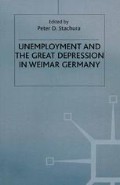Abstract
For a long time the lessons to be drawn from the failure of the economic policy of the Weimar Republic had seemed obvious: the claims of the reformist school of economic policy at that time were in many ways regarded as the only promising alternative to the deflationary policy of Heinrich Brüning.1 As long as the comprehensive theory of an anticyclical economic policy produced by John Maynard Keynes in 1936 enjoyed general acceptance,2 there was near unanimity among historians and political economists that a deficit-financed work creation policy in 1931–2 would not only have moderated the economic decline, but would have, furthermore, prevented the disastrous social, and above all, political consequences of the crisis. The expectations placed in the efficacy of a deficitary work-creation policy with regards the reduction of unemployment and the stimulation of the economy have in the meantime — in the world economic depression of the 1970s and 1980s — been heavily shaken. This could not fail to have a retrospective influence on the assessment of the economic policy of the early 1930s. The extremely controversial reception of the essay entitled, ‘Towards a revision of the traditional view of History’, presented by Knut Borchardt,3 owes much to the topical nature of the political questions which were raised in that context.4 It is certainly to Borchardt’s credit to have reminded us of the circumstances surrounding Brüning’s action — the influence of economic problems even of the 1920s, of the prevailing concepts of national economy, as well as obligations regarding foreign affairs, and in particular reparations. Whether Brüning really had no choice in the matter or whether there were other alternatives to his deflationary policy will be exhaustively examined.5
Translation from German into English by Ingeborg Schneider Peter D. Stachura.
Access this chapter
Tax calculation will be finalised at checkout
Purchases are for personal use only
Preview
Unable to display preview. Download preview PDF.
Editor information
Editors and Affiliations
Copyright information
© 1986 Peter D. Stachura
About this chapter
Cite this chapter
Schneider, M. (1986). The Development of State Work Creation Policy in Germany, 1930–1933. In: Stachura, P.D. (eds) Unemployment and the Great Depression in Weimar Germany. Palgrave Macmillan, London. https://doi.org/10.1007/978-1-349-18355-5_7
Download citation
DOI: https://doi.org/10.1007/978-1-349-18355-5_7
Publisher Name: Palgrave Macmillan, London
Print ISBN: 978-1-349-18357-9
Online ISBN: 978-1-349-18355-5
eBook Packages: Palgrave Business & Management CollectionBusiness and Management (R0)

